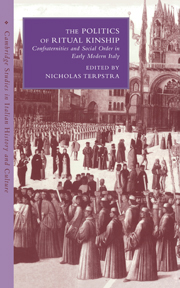Book contents
- Frontmatter
- Contents
- List of Contributors
- Acknowledgments
- Introduction The Politics of Ritual Kinship
- 1 The development of confraternity studies over the past thirty years
- 2 Homosociality and civic (dis)order in late medieval Italian confraternities
- 3 Confraternities and lay female religiosity in late medieval and Renaissance Umbria
- 4 The bounds of community: commune, parish, confraternity, and charity at the dawn of a new era in Cortona
- 5 Men and women in Roman confraternities in the fifteenth and sixteenth centuries: roles, functions, expectations
- 6 The Medici and the youth Confraternity of the Purification of the Virgin, 1434–1506
- 7 In loco parentis: confraternities and abandoned children in Florence and Bologna
- 8 The first Jesuit confraternities and marginalized groups in sixteenth-century Rome
- 9 Jewish confraternal piety in sixteenth-century Ferrara: continuity and change
- 10 The scuole piccole of Venice: formations and transformations
- 11 Relaunching confraternities in the Tridentine era: shaping conscience and Christianizing society in Milan and Lombardy
- 12 The development of Jesuit confraternity activity in the Kingdom of Naples in the sixteenth and seventeenth centuries
- 13 Corpus Domini: ritual metamorphoses and social changes in sixteenth- and seventeenth-century Genoa
- 14 Faith's boundaries: ritual and territory in rural Piedmont in the early modern period
- 15 The suppression of confraternities in Enlightenment Florence
- Bibliography
- Index
- CAMBRIDGE STUDIES IN ITALIAN HISTORY AND CULTURE
2 - Homosociality and civic (dis)order in late medieval Italian confraternities
Published online by Cambridge University Press: 02 October 2009
- Frontmatter
- Contents
- List of Contributors
- Acknowledgments
- Introduction The Politics of Ritual Kinship
- 1 The development of confraternity studies over the past thirty years
- 2 Homosociality and civic (dis)order in late medieval Italian confraternities
- 3 Confraternities and lay female religiosity in late medieval and Renaissance Umbria
- 4 The bounds of community: commune, parish, confraternity, and charity at the dawn of a new era in Cortona
- 5 Men and women in Roman confraternities in the fifteenth and sixteenth centuries: roles, functions, expectations
- 6 The Medici and the youth Confraternity of the Purification of the Virgin, 1434–1506
- 7 In loco parentis: confraternities and abandoned children in Florence and Bologna
- 8 The first Jesuit confraternities and marginalized groups in sixteenth-century Rome
- 9 Jewish confraternal piety in sixteenth-century Ferrara: continuity and change
- 10 The scuole piccole of Venice: formations and transformations
- 11 Relaunching confraternities in the Tridentine era: shaping conscience and Christianizing society in Milan and Lombardy
- 12 The development of Jesuit confraternity activity in the Kingdom of Naples in the sixteenth and seventeenth centuries
- 13 Corpus Domini: ritual metamorphoses and social changes in sixteenth- and seventeenth-century Genoa
- 14 Faith's boundaries: ritual and territory in rural Piedmont in the early modern period
- 15 The suppression of confraternities in Enlightenment Florence
- Bibliography
- Index
- CAMBRIDGE STUDIES IN ITALIAN HISTORY AND CULTURE
Summary
Civic and spiritual peace were goals explicitly sought by the people of late medieval urban Italy, yet in spite of enormous efforts by secular and ecclesiastical authorities alike, and the expenditure of enormous amounts of creative energy on the establishment of new political structures and new laws, and the proscription of old forms of vendetta-provoking behavior, peace continued to elude its pursuers during the thirteenth and fourteenth centuries. This essay examines some of the roles late medieval confraternities played in promoting peace in Italian cities, as they co-operated with communal authorities in their mutual concern for civic order; it also reveals that precisely in the kinds of co-operation they maintained with structures of communal power confraternities ultimately posed as much of a challenge to peace as they did a guarantee of its promotion. This ambivalent relationship between confraternal and communal peacemaking reflected similar tensions between other public groups, all of them ultimately grounded in the inevitable strains of a fundamentally homosocial society.
In 1216, an anonymous Florentine chronicler tells us, a dispute arose, initially between two men, but ultimately between two family factions. The original parties to the dispute were Oddo Arrighi and Buondelmonte de' Buondelmonti, and their initial disagreement arose over a point of dinner-table etiquette on the occasion of the knighting of a member of a third family, the Mazzinghi. Peace between the two original antagonists was initially sought, and it was agreed that Buondelmonte should marry a niece of Oddo Arrighi, a daughter of the Amidei family.
- Type
- Chapter
- Information
- The Politics of Ritual KinshipConfraternities and Social Order in Early Modern Italy, pp. 30 - 47Publisher: Cambridge University PressPrint publication year: 1999
- 1
- Cited by

